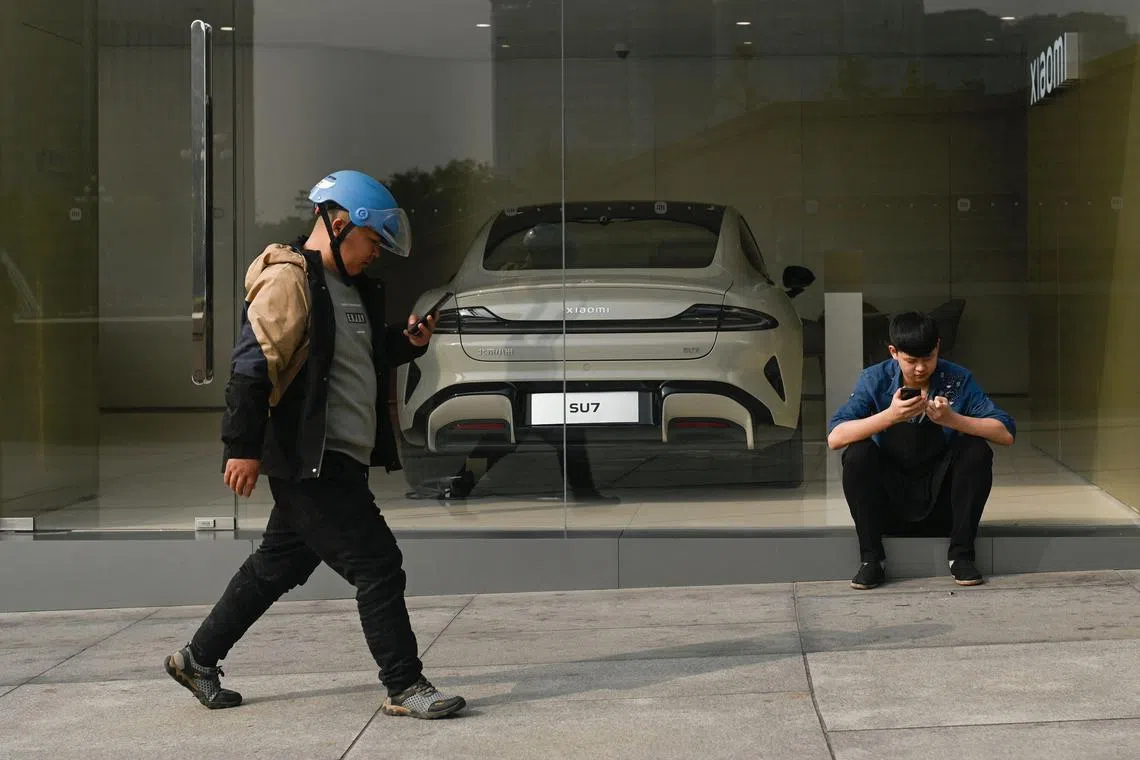China EV makers push self-driving as Tesla threat looms
Sign up now: Get ST's newsletters delivered to your inbox

Domestic electric car manufacturers are telling customers that their advanced driving-assistance services are coming very soon.
PHOTO: AFP
Follow topic:
Hong Kong – Autonomous driving and artificial intelligence (AI) are the buzzwords at this week’s Guangzhou auto show – the last major gathering of Chinese carmakers for the year.
With US billionaire Elon Musk’s Tesla aiming to bring what it markets as full self-driving to China in the first quarter of 2025, pending regulatory approval, domestic electric vehicle (EV) manufacturers are telling customers that their advanced driver-assistance systems (Adas) – which can navigate highways or busy city streets – are coming very soon, if they are not already here.
Last week, Xiaomi chairman Lei Jun conducted a live-stream test drive of the SU7 EV, going from “parking spot to parking spot”.
The feature is inspired by Tesla’s Full Self-Driving (FSD) end-to-end technology, which uses cameras and large AI models to make real-time driving decisions, rather than relying on engineers to code rules to simulate driving, Mr Lei said.
Although the safety and reliability of driver-assistance systems are still in question – with lawsuits and a US federal probe being mounted into Tesla’s Autopilot and FSD systems – many in the industry are betting on autonomous-driving technology as the future of mobility and are racing to stay ahead of competitors in the field.
Indeed, Mr Musk has staked Tesla’s future on solving self-driving.
In October, he unveiled a prototype of the Cybercab, though he admitted that the robotaxi – which has no steering wheel or pedals – will likely go into production only in 2026 at the earliest.
Geely Automobile Holdings’ premium Zeekr EV brand also used the Guangzhou show to launch version 2.0 of its smart driving solution – which includes end-to-end technology – and plans to roll out urban navigation to the entire country by the end of 2024.
The EV maker is also considering releasing its Adas technology for the global market in future.
Mr Chen Qi, who joined Zeekr in 2021 after running Huawei Technologies’ autonomous driving unit, said that while Tesla’s FSD will put pressure on Chinese EV makers, it is a good thing as it will promote more competition and innovation.
China’s home-grown engineers are also more than capable of coming up with good technology, he added.
“China’s talent in algorithms or software is more abundant than what’s found in some other countries,” Mr Chen said.
“Looking globally at those who are working on intelligent driving, other than Chinese companies, the most advanced is Tesla,” he added.
“And China has unique road conditions and regulatory requirements, so when Tesla enters the market next year, it may not adapt straightaway.”
Search giant Baidu and Geely’s joint venture Jidu Auto, also known as Jiyue in China, has pushed the envelope and applied AI to its electric hypercar, the Robo X.
The racer can accelerate from 0 to 100kmh in just 1.9 seconds and has a range of 650km on a single charge.
While the price has not been set, customers can put in an order with a 49,999 yuan (S$9,279) deposit.
“The Robo X is almost like an experiment to be able to push the boundaries for the future of AI autonomous driving and also the AI experience for any mobility products,” said Jidu head of design Frank Wu at the auto show over the weekend.
Xpeng, Li Auto and Great Wall Motor were among other carmakers who unveiled their latest intelligent driving offerings at the show, which runs until Nov 24.
“Faster speed, more accuracy, better electric output efficiency, better aerodynamics and driving balance,” Mr Wu said.
“AI can make cars do everything better.” BLOOMBERG

